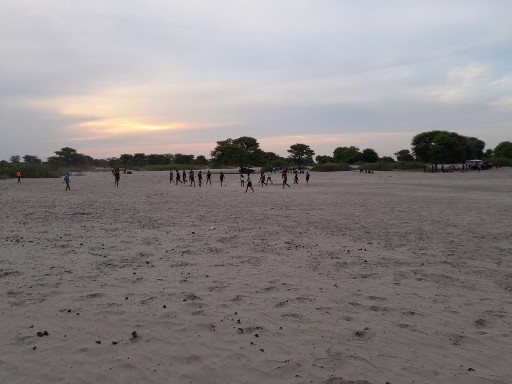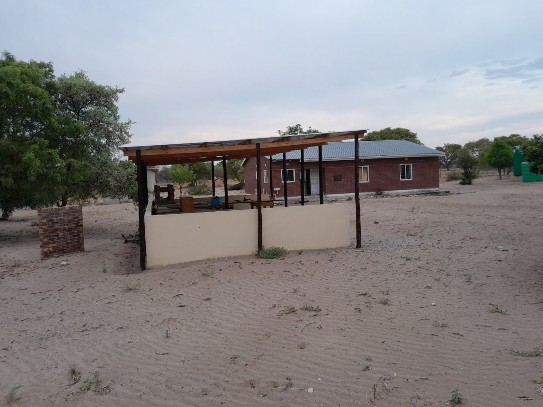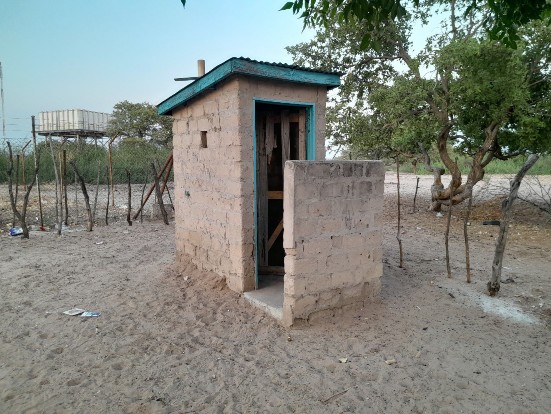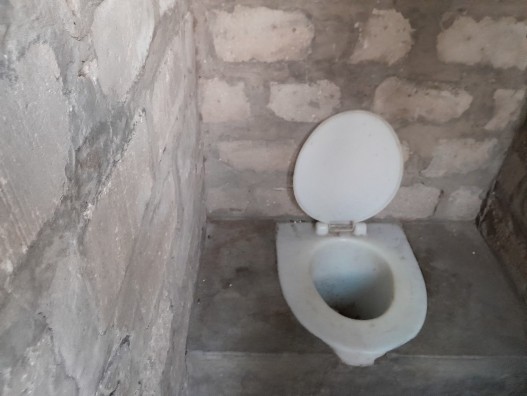Report on the Dispatch to Botswana, Namibia, and South Africa: Grounding of Scientific Research (S)
Akira Takada
Professor
Graduate School of Asian and African Area Studies
Kyoto University

From September 24 to December 15, 2022, I visited the University of Botswana, New Xade Village in Botswana, the University of Namibia, Ekoka Village in Namibia, and the UNESCO Namibia office and so on, to hold research meetings and collect data related to this project. This was my first long term overseas research since Covid-19, which almost stopped my overseas trip for more than two and a half years.
At the University of Botswana, I first visited the Department of African Languages and Literature, the San Research Center, and the Department of Environmental Health, which will be our counterpart for this research project, and met with Professor Budzani Gabanamotse-Mogara, Professor Andy Chebanne, Associate Professor Maitseo Bolaane, and Senior Lecturer Roy Tapera. In addition, I collected data on the contact zones of hunter-gatherers and agro-pastoralists in Botswana. In this meeting, we introduced the concept of this project, exchanged opinions on the planning and management of the project, renewing the research permit, exchanged information on the future dispatch and invitation of faculty members and graduate students between Botswana and Japan, as well as on the recent situation of researchers who have conducted research in Botswana. In addition, concrete proposals and coordination were made to further promote academic exchange between the University of Botswana and Kyoto University.
Next, we visited New Xade Village in the Ghanzi District, which is a research site that I have been visiting for a quarter of a century since I was a graduate student. New Xade Village was established as part of the Botswana government’s policy to resettle people dwelling in remote areas, and is home to more than 1,500 people, mainly G|ui and G||ana, who are known as indigenous hunter-gatherers in the area. In this survey, I visited an elementary school and OSET (Out of School Education and Training) in New Xade Village, which are closely related to this project (Photos 1 and 2).
OSET is an organization that promotes non-formal education for elementary school dropouts. In Botswana, education has been promoted based on an understanding of the culture and language of the Tswana people, who are the overwhelming majority in the country, but in recent years, there has been a growing movement to respect the culture and language of minority groups including the G|ui and G||ana. OSET is an important organization for the future of such policies as well as for the socialization and cultural reproduction in the contact zone between hunter-gatherers and agro-pastoralists, which is the subject of this project. We will continue to pay attention to its activities.

In this project, we are paying particular attention to health issues in the resettlement areas of Botswana. As part of this, preliminary observations were made on the latrines in New Xade Village (Photos 3 and 4). These latrine facilities are made from concrete and built in the plots of the residents’ houses with the support of the government after the establishment of New Xadé Village. The structure is simple with holes dug several meters into the ground, with no sewage system and no pumping. At the time of the survey, the toilets were not fully functional due to the lack of water supply from the village water system. Future surveys will be conducted to analyze the sanitation situation, including toilets and water supply.


Then I moved to Namibia. First, I visited the University of Namibia in Windhoek, the capital of Namibia. At the Department of Sociology, we had a meeting on the contact zones between hunter-gatherers and agro-pastoralists in Namibia with our counterpart, Dr. Romie Nghitevelekwa. She is an excellent researcher specializing in land issues in Namibia’s hunter-gatherer and agro-pastoralist contact zones, and is considering visiting Kyoto University and conducting joint research in the field as part of this project.
In Windhoek, the University of Namibia Press (UNAM Press) hosted the Book Launch to celebrate the publication of the book “Hunters among farmers: The !Xun of Ekoka”, which I published from the UNAM Press in 2022 <https://www.facebook.com/photo?fbid=560738866052980&set=a.461081219352079>. I was also selected as the publisher’s Author of the Month for November 2022, and I could have enthusiastic discussions between researchers from international and local research institutes, as well as general public at the Book Launch.
After that, I visited Ekoka village in Okongo district, north-central Namibia, which is the main field site of the above book and where I have been conducting research on the !Xun, a group of the San, since I was still a graduate student. In Ekoka village, the above book was donated to local residents and organizations, and field research was conducted on building an ecological future for child rearing among the !Xun <https://www.facebook.com/photo?fbid=594997532627113&set=pcb. 59500959525959247>. Although my stay was short, I was able to have a heartwarming exchange with the youth and children of the following generation in addition to my old friends and acquaintances.
After that, I conducted a preliminary field survey on the ecological future of child rearing among the Himba in the Ozondundu Conservation Areas in northwestern Namibia, which I cannot fully describe due to the limited space of the report, and had a meeting with Helvi Elago, National Program Officer, UNESCO Namibia Office, Windhoek, on the ecological future of child rearing in the contact zones of hunter-gatherers and agro-pastoralists in Namibia, and collected relevant research materials to lay the foundation for the project “Ecological future making of childrearing in contact zones between hunter-gatherers and agro-pastoralists in Africa”. The trip this time lasted about three months, which is a relatively long for a professor, but I have the impression that it passed very quickly probably because I was able to spend a fulfilling time. I would like to express my gratitude to the people and organizations that made this possible.
